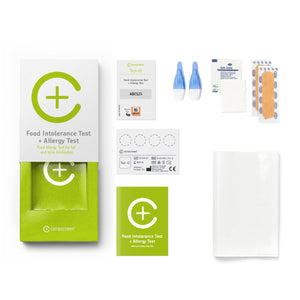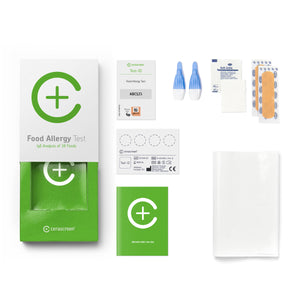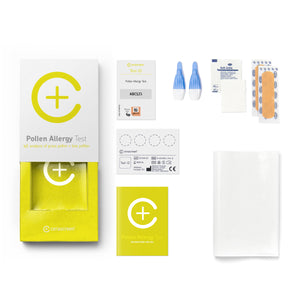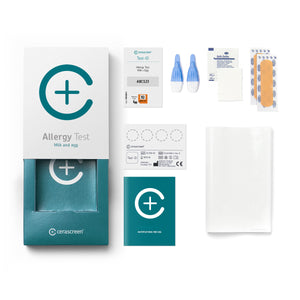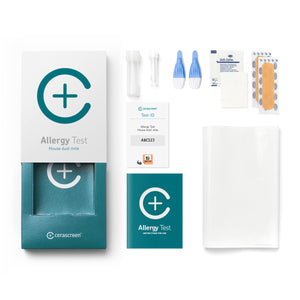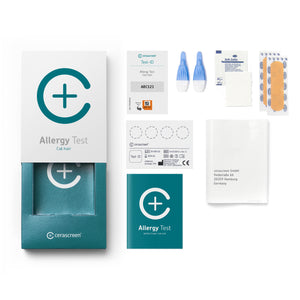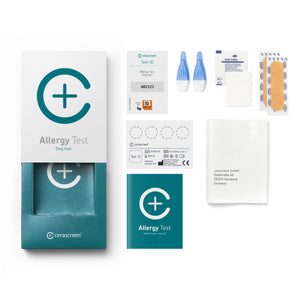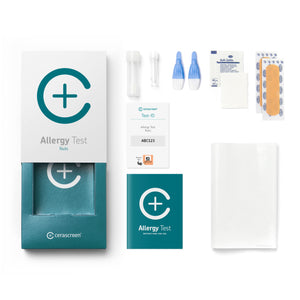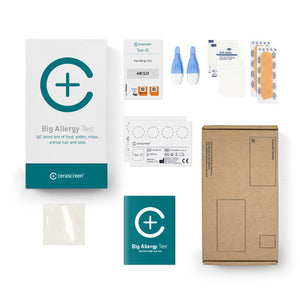Home Allergy Tests
Choose categoryselftests
health-coaching
all
/blogs/health-portal
/pages/about-us
What is an allergy?
An allergy is considered a civilisation disease, which has become and is continuing to become more and more prevalent in the Western world since the mid 20th century. In Europe, around 60 million people are affected by allergies. The United Kingdom has some of the highest rates of allergies in the world, with over 20 per cent of the population affected by one or more allergies.
To understand home allergy tests, it is worth understanding what happens when you have an allergy. The immune system reacts defensively to allergens when they enter the body; these allergens are in fact completely harmless. These allergens are usually proteins found in food, pollen, animal hair and house dust mites, among other things. You can easily get to the bottom of this by performing e.g. a Pollen Allergy Test or a House Dust Mite Allergy Test.
If you have an allergy, your body develops a sensitisation to allergens. It produces large amounts of certain IgE antibodies that attach themselves to the mast cells of the immune system. When the allergens enter the body again, they attach to the IgE antibodies – these cause the mast cell to release the messenger substance histamine. Histamine is what causes inflammation in the body and thus symptoms such as sneezing, sniffing nose, itchy eyes, skin rashes, dizziness and gastrointestinal problems.
How do I carry out a home allergy test?
A home allergy test can be carried out discreetly in the privacy of your own home with the cerascreen home allergy test kits. The allergy test kits target different types of allergies, including food allergies with the Food Allergy Test or animal hair allergies with the Animal Hair Allergy Test. cerascreen is constantly developing new home allergy tests, including our more specific allergy tests, such as our Dairy and Egg Allergy Test and Latex Allergy Test. Keep your eyes peeled for our new additions!
For our home allergy tests, you take a small blood sample from your fingertip and send it to a medical laboratory by using the free return envelope. The medical laboratory analyses the sample and measures the concentration of specific IgE antibodies in your blood. You will then receive an individual results report which reveals whether and to what extent you are sensitised to the allergens tested.
IgE antibodies in your blood do not automatically mean that you have an allergy, but it gives you a good initial indication of which foods or materials you may react to. You can follow this up with a doctor or a specialist who can make a reliable allergy diagnosis. The individual results reports also provide you with further recommendations – for example, on what you can do if you suspect you have a food allergy.
Allergy testing at home made simple
There are different ways to test for allergies. A common way that doctors use is the prick test method. This involves scratching various allergens slightly under the skin. If your skin reacts with one of the allergens within a few seconds or minutes, this is how you know that you have a sensitisation to the allergen.
With the cerscreen® Allergy Test Kits, a sensitisation to an allergen can be detected in the blood. Laboratories can check the concentration of specific IgE antibodies in a blood sample that you can easily and conveniently collect at home with the allergy test kit. The antibodies detected in such an allergy test can be assigned to allergens – and thus to certain foods or types of pollen, for example.
It is important to note that sensitisation is not the same as an allergy. Sometimes, an allergy test reveals that there are a lot of IgE antibodies in the blood, even if they don’t cause an allergic reaction. Doctors will only diagnose you with an allergy if you experience typical allergy symptoms. To be really sure, you can take a provocation test. This is where a doctor gives you incremental doses of an allergen and observes whether symptoms appear. Such a test can result in an allergic reaction and should therefore only be carried out under a doctor’s supervision!







